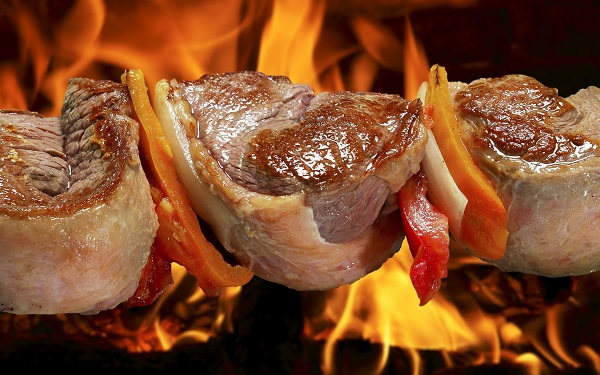FWP:
SETS == GROTESQUERIE; KYA
Everybody quite rightly reads the second line as a question. But we do so only for semantic reasons, since it appears as a flat statement. Such is the power of the colloquial omission of 'kya'.
Everybody agrees that in the ghazal world the lover's wounded heart is on fire and burning, and eventually may burn away completely (see {5} for several examples). But can that metaphor be fruitfully concretized in a culinary direction, with the heart as burning/roasting meat or even explicitly as a 'kabob'? Plenty of poets have thought so, including Mir, as Faruqi points out.
The commentators here are also very comfortable with the vision of burnt or roasted meat; Bekhud Dihlavi explicitly brings in the kabob itself. In my view, this image crosses the line into the category of 'grotesquerie'-- excessive physicality, of a grossly detailed kind that, poetically speaking, just doesn't work. Kabobs have too many other qualities-- they drip with juice, they may be greasy or chewy, they are surrounded with onions and green peppers, they are delicious-- that interfere with our imagining of the lover's wounded heart.
To what extent does Ghalib encourage this kind of explicit 'meat' vision? Certainly he opens the possibility, for what other kind of 'smell' could be expected to come from the wounded heart, if not that of burning? (Don't think of smelly pus or gangrene; those are not in the ghazal's repertoire of ailments.) And what other 'objective correlative' do we have except the physical, fleshy, meaty heart itself, that could generate an actual smell of burning or roasting? So it's certainly not a forced interpretation. And don't forget that in {6,4} the lover cheerfully imagines his heart as a feast, and his friends as enjoying it to the full extent that their 'lips and teeth' permit.
But in the present verse, Ghalib does also distance himself a bit from the physicality of it. There's that rhetorical question, after all-- the lover doesn't himself say anything about burning, but only makes an inquiry. And the inquiry seems sarcastic, irritated-- perhaps the lover is patronizing the poor inept would-be healer, or insulting him by pointing out his incompetence. Perhaps the rhetorical thrust, the desire to make a strong sarcastic sneer, outweighs any attempt at clinical description of actual burning flesh or roasting meat.
But it's also possible that the verse may be describing the metaphysical or transcendent nature of the fire in the heart; think of {5,3}, in which the lover's fiery sighs were in a universe of such fancy nonexistence that they no longer burned even the feathers of the Anqa. Possibly the lover is just calmly describing to his doctor the (new?) refinement or subtlety that his burning passion has attained, and forgiving him for his inability to diagnose it. This reading makes the verse an elegant introduction to the next verse, {161,8}.
I can't resist adding one more 'kabob' example from Mir [M{117,8}]:
bū-e kabāb-e soḳhtah ātī hai kuchh dimāġh meñ
hove nah hove ai nasīm rāt kisī kā dil jalā
[the scent of a roasted kabob comes somewhat into my nose
very likely, oh breeze, last night someone's heart burned]

Nazm:
In the second line is a rhetorical question, and reproach of the incomprehension of the healer. (174)
== Nazm page 174